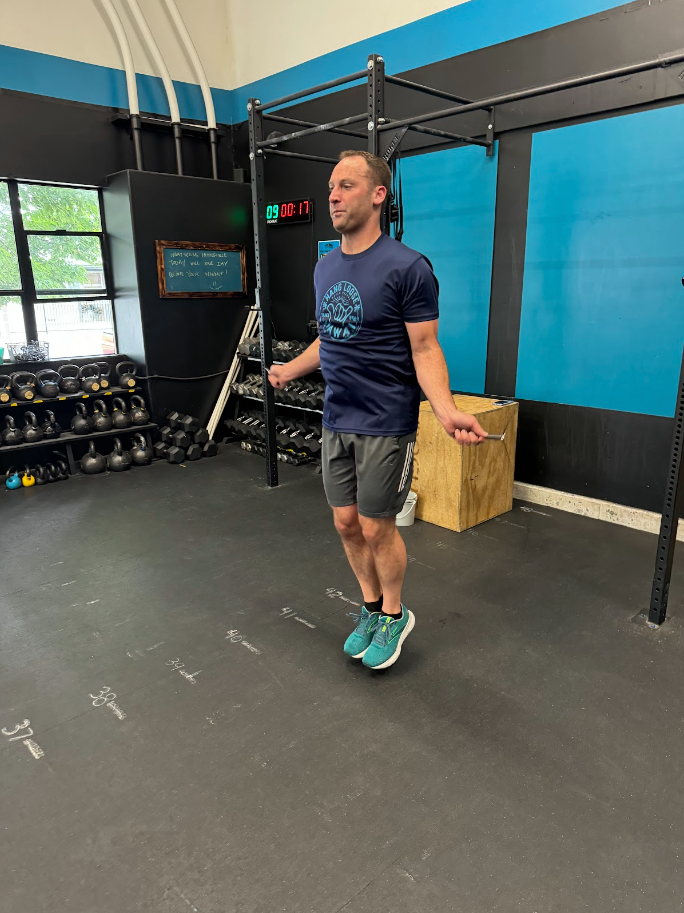09/23/24 Mt. Tabor CrossFit Newsletter
Howdy from Alex
Asking for help does not mean that we are weak or incompetent. It usually indicates an advanced level of honesty and intelligence — Anne Wilson Schaef
Have you ever sat in front of your computer trying to figure out a spreadsheet knowing that some people actually make these for fun, or left a workout feeling like you are not sure why it is so hard when it didn’t seem that hard for those around you…how do you crack the code? Reps and asking better questions.
It takes time & reps to figure out what we are good at and it takes time and reps to see where we could improve. If the “story” you tell yourself is that you aren’t good at something and that you can’t be good at something then I guess you are all set. If you are struggling with something you want to improve on and ask for help you may be surprised that the solution is easier than you thought and you now have a new talent.
Keep doing the reps, letting us help and keep getting more awesome.
-Alex
Member Highlight

1. What brought you here?
Found out having a surprise baby and not having worked out in 4 years causes life changes.
2. What’s your favorite part/movement?
I don’t know why but I love DB Snatches.
3. Do you feel like we help you in your daily life?
Absolutely. Not just physical but mental health. And seeing friends is a big part of it.
Understanding and Improving Your Sleep Quality
By Coach J. Ryder Williams
We all acknowledge the importance of sleep, but despite this awareness, many of us struggle to get enough rest. Sleep is a vital component of our health and well-being, but what does science say about its benefits, and how can we ensure we’re getting the quality sleep we need?
What is Sleep?
According to the Encyclopedia Britannica, sleep is “a normal, reversible, recurrent state of reduced responsiveness to external stimulation accompanied by complex and predictable changes in physiology.” In simpler terms, sleep is when your body relaxes and performs essential functions, including processing information and going through several distinct sleep cycles. These cycles consist of three Non-Rapid Eye Movement (NREM) stages and one Rapid Eye Movement (REM) stage, each playing a crucial role in overall health.
Understanding Sleep Stages
- Transitioning Sleep: This stage occurs as you first attempt to fall asleep. Your breathing patterns align with your normal rate, and this period typically lasts about 5-10 minutes. It may vary depending on factors like exhaustion or stress.
- Light Sleep: Once you enter light sleep, your body starts to consolidate memories and enhance skill retention. This stage also marks a drop in body temperature and further relaxation. Light sleep is not merely a transition but a crucial phase for cognitive functions and memory consolidation.
- Deep Sleep: As the deepest stage of sleep, deep sleep is essential for physical repair. It supports muscle recovery, bone repair, and boosts the immune system. If you wake up feeling groggy or disoriented, it’s likely because you were awakened during this restorative stage.
- REM Sleep: REM sleep is often associated with vivid dreaming. During this phase, brain activity is high, resembling wakefulness, but muscle activity is inhibited to prevent acting out dreams. REM sleep is vital for cognitive functions, such as problem-solving and emotional regulation.
Why Sleep Stages Matter
Adequate sleep is crucial for cycling through these stages. Insufficient sleep prevents your body from reaching deep and REM stages, which can lead to various physical and mental health issues. Lack of deep sleep impacts physical recovery, while insufficient REM sleep can affect cognitive functions and emotional stability.
Tips for Better Sleep
Improving your sleep quality involves adopting healthy sleep habits. Here are some strategies to help you build better sleep routines:
- Stick to a Sleep Schedule: Consistency is key. Aim to go to bed and wake up at the same time every day, even on weekends, to regulate your body’s internal clock.
- Limit Caffeine Intake: Avoid caffeine after 1 or 2 p.m. as it can interfere with your ability to fall asleep. Caffeine can remain in your system for hours, disrupting your sleep cycle.
- Control Your Sleep Environment: Create a sleep-conducive environment by keeping your bedroom dark, cool, and free from distractions like TVs and smartphones. A comfortable setting promotes deeper and more restful sleep.
- Manage Daytime Naps: While napping can be beneficial, keep naps short—ideally under an hour—to avoid disrupting your nighttime sleep.
- Stay Active: Regular exercise enhances sleep quality. Engaging in physical activities like attending fitness classes, hiking, or biking can improve your overall sleep pattern and help you fall asleep faster.
Understanding the science of sleep reveals just how crucial each stage is for our overall health. From the restorative benefits of deep sleep to the cognitive enhancements during REM sleep, each phase plays a vital role in maintaining our well-being. By adopting consistent sleep habits, managing your environment, and incorporating regular exercise, you can improve both the quality and quantity of your sleep.
Prioritizing these practices not only enhances your nightly rest but also contributes to your long-term health and productivity. So, take charge of your sleep health today and enjoy the profound benefits of a good night’s rest.
About the Author
Coach J. has been in the fitness industry for ten years, serving as a CrossFit Coach for eight years, and as a US Army Medical Sergeant for six. He has worked with athletes of all levels, from soldiers and collegiate athletes to fitness beginners.
Skillz & Drillz
Fun little progression if you wanna try and add a little pizazz to your jump rope!
Committed Members Callout
Just a shout out to the members of the committed club.Just a shout out to the members of the committed club.
The post 09/23/24 Mt. Tabor CrossFit Newsletter appeared first on Mt. Tabor CrossFit.







